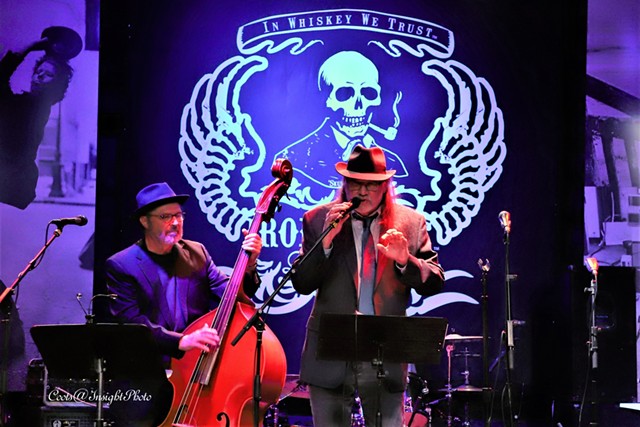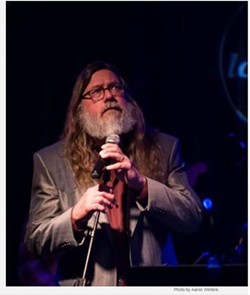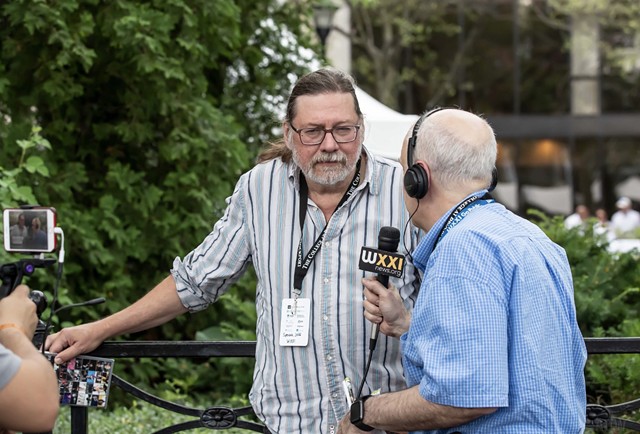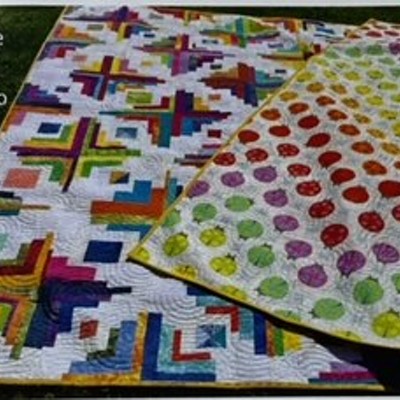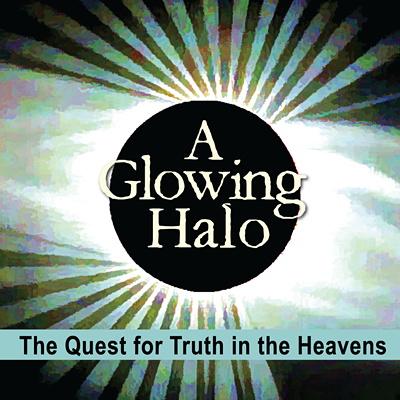[
{
"name": "500x250 Ad",
"insertPoint": "5",
"component": "15667920",
"parentWrapperClass": "",
"requiredCountToDisplay": "1"
}
]
I am in a reflective mood these days. Because on November 3, I am bringing an end to this long, strange trip. Forty-four years of writing for newspapers, web sites and, these last five or so years, offering radio commentary.
As an entertainment writer, I concede I am no longer relevant: I cannot name one Taylor Swift song. And now, someone else is gonna have to write those damn Rochester Jazz Festival haikus.
It has been a career initially spent – or misspent, perhaps – as a sportswriter and editor. Jobs in seven cities over my first 10 years in the business. Interviews ranging from Pete Rose to Mickey Mantle (who seemed a bit hungover that morning). And a Finnish Olympic ski jumper, who said the best way to train for the event – and summon the courage to slide down that mountainside ramp to launch himself airborne – was to leave a bottle of vodka, as a reward, at the end of the downhill run.
Minus the skis, that’s kind of how it’s worked for me as well all these years.
I figured the Rochester stop might last five years. Even after the first three years, as I bolted from sports, and the nonsense that accompanies it, to the arts pages of the local paper.
That was 31 years ago. Wrong, once again.
Why did I stay so long? Tired of packing and moving? Or perhaps it was the fascinating opportunities that continuously presented themselves. Such as the winter afternoon I spent with Leon Redbone walking through Riverside Cemetery in search of the grave of Lee Morse, a female jazz singer of the 1920s and ’30s, and a favorite of Redbone’s. I wasn’t sure how to take the rolling anachronism of a man. He talked and sang songs that sounded as though they were coming out of an old Victrola. He dressed like someone from the past who had stepped through a portal and found himself in a future that he wasn’t quite interested in being a part of. He was wary of these times, he said. No good would come of the technologies obscuring our humanity. In simpler times, Redbone said, at least we could see the dangers that confronted us: we were doomed to be slaughtered by some genetically inferior horde riding out of the hills.
Quirky. Kinda funny. Was he simply staying in character for my benefit? Or was he always like this?
Morse was a perfect Holy Grail of Jazz for Redbone. Born in rural Oregon, she began recording jazz in 1924. She had a few hits, although a hit was defined a little differently in her day than it is now. “I’ve Got Five Dollars,” that was one. “If You Want the Rainbow,” that was another. Sometimes she yodeled in the midst of the song. She was in a few short films as well.
She was quirky. Kinda funny.
But her career dried up, and heavy drinking seemed to play a role. A few comeback attempts failed. She married a man from Rochester in 1946, and launched yet another comeback attempt. She sang here in clubs and appeared on the radio. But again, the comeback failed, and she died here in 1954, at age 57.
Redbone and I never found Morse’s grave that afternoon. Instead, we went back to his hotel, sat at the bar and drank a couple of whiskies. I returned to Riverside Cemetery later that spring, and did find where Morse is buried, beneath one of those flat grave markers. We hadn’t found it because of the snow.
Redbone is dead now. I’m not. Maybe now is the time to look back, read through the old stories. Pull out pieces of the best ones, and present them here. Years ago, I estimated I had done 1,000 interviews. Mostly musicians. Mostly on the telephone. Patti Smith. B.B. King. Peter Gabriel.
David Byrne painted a nice picture of his surroundings for me: sitting in a comfortable armchair in his living room, drinking a glass of white wine. Elvis Costello didn’t exactly confess to being thrown out of Scorgie’s, the old bar on Andrews Street, but did concede that “it could have happened.”
In person, I interviewed Johnny Cash and porn star Traci Lords. I spent one surreal evening drinking beers with film director Oliver Stone, who was in Rochester to speak at a college and equally eager to hang out in a bar frequented by college women.
Al Franken and I arrived early at a downtown Rochester hotel in 2006, before he was to broadcast his “Air America” radio show live from The Little Theatre. The room reserved for the breakfast meeting with a handful of invited guests was locked. We stood in front of the door as a hotel employee wandered off to find a key.
“You look really tired,” I said.
Franken admitted the week’s travel schedule had been pretty rough.
“Well, let’s sit while we wait,” I said.
So we sat. On the floor. We talked a little about the rumors that Franken was considering a run for the U.S. Senate seat from Minnesota, rumors he had neither confirmed nor denied. He then went on for a few minutes about what he’d hope to accomplish as a senator.
I said something like, “You know, you’ve pretty much admitted right here that you’re going to run.” He just smiled.
In the early days of the COVID pandemic, Sen. Chuck Schumer showed up in town to describe some of the federal government’s programs designed to save our music culture from the coronavirus pandemic. There he was, in the Bug Jar. Rochester’s tiny indie-rock club. “I heard the Black Keys – they were one of my favorites – and Lizzo played here?” he said. “Wow. So this is a pretty good place. Pretty hip place.”
Chuck Schumer… digging The Black Keys.
Lou Gramm showed me some of his cars, cool ’60s-era Chevys with an eye for design that no auto-manufacturing conglomerate bothers with anymore. Local musicians? Yes, we can call Gramm a local musician. We’re so blessed. The first time I heard Danielle Ponder, she was singing R&B and soul in Java’s Cafe on Gibbs Street. Now she’s on “Jimmy Kimmel Live!” and playing stages all over the world. The pop band Joywave as well, touring the U.S. and Europe, hitting the late-night talk shows. Yet when the tours are over, they come home to Rochester.
I miss the irreverence of all of those local garage pop bands that used to play the Bug Jar. But an evening is still well spent at The Little Theatre Café with The Margaret Explosion. What’s it all add up to? By now, I’m likely closing in on 2,000 interviews. And plowing through all of those would be an insane task.
So I’ll just think back on those 31 years. Whatever comes to mind ...
Tony Bennett. He told me about serving in the U.S. Army during World War II – he was Anthony Benedetto then – sitting in his foxhole on the edge of the Battle of the Bulge. And how he and the rest of his fellow soldiers could hear the German soldiers in their own trenches, their voices carrying across the snow-covered field separating the two armies.
Thomas Warfield. The director of dance at Rochester Institute of Technology and senior lecturer at the school’s National Technical Institute for the Deaf, Department for Performing Arts, Warfield recalled the New York City afternoon when he had lunch with the conductor and composer Leonard Bernstein. A lunch that, Warfield said, “changed my whole life. He said to me, ‘The artist is the person who has the vision and moves society ahead. That’s your job.’” The arts. Moving society forward.
Robin L. Flanigan. Her book, “100 Things to Do In Rochester Before You Die” functions as a guide book. Before I die? What’s the hurry? And there’s gossip here: Richardson’s Canal House was a nudist colony in the 1930s.
Stewart Copeland. The one-time drummer for The Police was in town for a collaborative concert with the Rochester Philharmonic Orchestra. By then, Copeland had moved on to writing film soundtracks. “Since I didn’t know how to do it, I did it all different. Which is another word for revolutionary.”
“Revolutionary and wrong are sometimes the same thing.”
Scott Wallace and Doug Curry are the Friday night DJs on WRUR-FM (88.5). The music is ultra-cool soul, R&B, jazz and blues. “And then, of course, the fun was really trying to find the obscure stuff,” Wallace said. “That’s a bottomless pit right there, when you do something like that. And 40 years in, I’m still finding stuff I never heard of.” And it’s historically important, as Curry said, “This music stopped being what it was with integration. Once integration happened, then the bedrock of the blues was wearing away. This music is about living in a certain way, in a certain place, in a certain time. And that certain place and time and way of living disappeared, gradually. Or so people thought. Hip-hop said, ‘No, it’s still here....’”
Noam Chomsky. Linguist, writer, deep thinker, media critic and, as our conversation was in 2016, a citizen horrified by the prospect of the oncoming Trump presidency. Before he was to speak at The Little Theatre, we talked. Just that morning, he had been reading a newspaper story on a poll showing 48% of Americans do not believe in evolution. “That’s a remarkably low level of general education,” Chomsky said. “I don’t think you can find that anywhere else. Maybe a primitive society.”
Sarah Freligh. She lives in downtown Rochester, composing poems and short stories whose characters carry the weight of people who have just about had enough of this world. Washing up like driftwood on the river’s shore. Freligh composes her stories in yellow, spiral-bound notebooks, rather than on a computer. The internet, she said, “makes you feel connected, when you’re anything but.”
Nod is Joe Sorriero, Tim Poland and Brian Shafer. A Rochester band that’s created a ragged punk-rock niche for more than three decades. “Sometimes people just don’t get it,” Shafer said. “And that’s OK. We’re kind of used to that.” Sorriero added, “People used to have to declare that they ‘got it’ or not. What I don’t understand is, why you would have to ‘get it.’ You don’t have to ‘get it.’ It’s not a prerequisite for listening to music, or being into music.” And from Shafer, “I think the best Nod shows are the ones where people said they didn’t know what was going to happen next. And they were OK with that.”
Awadagin Pratt. A nationally renowned classical pianist who played with the Rochester Philharmonic Orchestra and a Black man, Pratt recalled his time as a student at Johns Hopkins University when he was late for class, running down the street. A cop chased him. “I was on the steps of the school, he was demanding identification. The security guards were telling him I was a student. He had assumed, I guess, I was running from a crime or something. I said, ‘When my white friends are running down the street, do your colleagues ask if they’re OK?’ Not, like, what they’re doing.”
Seth Faergolzia. A Rochester musician whose sound seems to come to us from the third moon of Saturn. A puppeteer who makes his own clothes. A painter of pictures, sometimes in conjunction with music. A creator of Claymation videos. Composer of the musical “Fun Wearing Underwear.” Skeptic. “I believe we can change our immediate environments, but I don’t know if you can change the general greed of this giant mass of humans.”
Joanna Scott. An acclaimed novelist and professor at the University of Rochester, Scott recalled one rationale for choosing to live here rather than a literary center such as New York City. “Maybe it’s better to be a little isolated as an artist.”
Dayna Kurtz. In Rochester for a show at The Little Theatre, Kurtz explained why she believes popular American music is on the decline. “The thing that I like so much about 1947 to 1962 musically is that every American form of art, in my opinion, was kind of at its zenith. Like, country music was best then. To me, you know? Jazz was at its best. Rock and roll was at its best. And there were much, much fewer lines between them. And radio stations. You listen to a radio show from that era, they’ll play Dinah Washington next to ‘How Much is That Doggie in the Window?’ It was before everything was so completely separated by genre.”
Roy McCurdy. The iconic jazz drummer, a member of the Rochester Music Hall of Fame, said change isn’t guaranteed to be a move forward. “I think without a doubt, especially since Trump came in. He tried to take everything backward anyway. It’s a shame, because things were going forward, and now it’s going backward. And the attitude that’s going around now since Trump came in, it’s a very dangerous attitude. It’s giving some people the right to do things that they probably never would have done before.”
He said that a few years before Jan. 6, 2022.
Jill Sobule. A singer and songwriter, she played The Little Theatre. “I am intrigued by what we get as news, and what makes the headlines, and what doesn’t make the headlines. What makes a person follow a cult or an extreme movement…? It must be comforting to have such a black-and-white view of the world.”
Danny Deutsch. In 2008, he opened one of Rochester’s best live music venues, Abilene Bar & Lounge. The bands can be unpredictable. “I walked into the dressing room one time on the second floor,” he said, “and Lee Ving from Fear was throwing a television out the window. It happened to be my black and white television, but he was throwing it out the window.”
Genesee Johnny. The Rochester singer-songwriter concedes that, as a white guy playing the blues, there may not be prejudice or racism in the intent. “It was never about that, ‘You can’t do it and be white.’ It was never about keeping anybody from doing it. It’s more about, just like all the other race-relations stuff in our country, you just kind of succumb to the whole white supremacy, white structure of things. And people don’t even realize it’s going on, or that they’re actively participating in it. They don’t mean it to be that way, and they don’t want it to come across that way. It’s just how it ends up being.”
Watkins & the Rapiers. The Rochester band has now written more than 100 Christmas songs, which it believes is a world record. For this world, anyway. As the band’s Kerry Regan noted, “We’ve covered a lot of topics related to Christmas, trying to dig deep.” And that’s where the challenge lies. “How deep can you dig into Christmas?”
Rosie Flores. We were talking about her long career as The Rockabilly Filly. Years touring. Then, silence from her end of the phone line. And… a slight noise. I realized she was crying. After taking a few moments to compose herself, she explained. All of those years on the road, playing for audiences, had never allowed time for Flores to have a family, raise kids. Live a life like the ones lived by so many of the people who came to her shows. She had sacrificed for her music.
Connie Deming. Is she the best singer in Rochester’s clubs? Depends on your measuring stick. But after I got laid off by the daily newspaper here, my friends threw a party for me. They used all of the plaques I had won over the years, writing awards, as coasters for the casserole dishes. And in the backyard that night, even better than crickets, the guitars came out. Musicians singing. Deming did Jefferson Airplane’s “White Rabbit.” And I sat at the back of the crowd, in the shadows of the trees, because I didn’t want anyone to see that I was crying. Not because I was sad. But because the music was so beautiful.
Jeff Spevak is senior arts writer for WXXI/CITY Magazine—for a few more days, anyway. He can be reached at (585) 258-0343 or [email protected].
As an entertainment writer, I concede I am no longer relevant: I cannot name one Taylor Swift song. And now, someone else is gonna have to write those damn Rochester Jazz Festival haikus.
It has been a career initially spent – or misspent, perhaps – as a sportswriter and editor. Jobs in seven cities over my first 10 years in the business. Interviews ranging from Pete Rose to Mickey Mantle (who seemed a bit hungover that morning). And a Finnish Olympic ski jumper, who said the best way to train for the event – and summon the courage to slide down that mountainside ramp to launch himself airborne – was to leave a bottle of vodka, as a reward, at the end of the downhill run.
Minus the skis, that’s kind of how it’s worked for me as well all these years.
I figured the Rochester stop might last five years. Even after the first three years, as I bolted from sports, and the nonsense that accompanies it, to the arts pages of the local paper.
That was 31 years ago. Wrong, once again.
Why did I stay so long? Tired of packing and moving? Or perhaps it was the fascinating opportunities that continuously presented themselves. Such as the winter afternoon I spent with Leon Redbone walking through Riverside Cemetery in search of the grave of Lee Morse, a female jazz singer of the 1920s and ’30s, and a favorite of Redbone’s. I wasn’t sure how to take the rolling anachronism of a man. He talked and sang songs that sounded as though they were coming out of an old Victrola. He dressed like someone from the past who had stepped through a portal and found himself in a future that he wasn’t quite interested in being a part of. He was wary of these times, he said. No good would come of the technologies obscuring our humanity. In simpler times, Redbone said, at least we could see the dangers that confronted us: we were doomed to be slaughtered by some genetically inferior horde riding out of the hills.
Quirky. Kinda funny. Was he simply staying in character for my benefit? Or was he always like this?
Morse was a perfect Holy Grail of Jazz for Redbone. Born in rural Oregon, she began recording jazz in 1924. She had a few hits, although a hit was defined a little differently in her day than it is now. “I’ve Got Five Dollars,” that was one. “If You Want the Rainbow,” that was another. Sometimes she yodeled in the midst of the song. She was in a few short films as well.
She was quirky. Kinda funny.
But her career dried up, and heavy drinking seemed to play a role. A few comeback attempts failed. She married a man from Rochester in 1946, and launched yet another comeback attempt. She sang here in clubs and appeared on the radio. But again, the comeback failed, and she died here in 1954, at age 57.
Redbone and I never found Morse’s grave that afternoon. Instead, we went back to his hotel, sat at the bar and drank a couple of whiskies. I returned to Riverside Cemetery later that spring, and did find where Morse is buried, beneath one of those flat grave markers. We hadn’t found it because of the snow.
Redbone is dead now. I’m not. Maybe now is the time to look back, read through the old stories. Pull out pieces of the best ones, and present them here. Years ago, I estimated I had done 1,000 interviews. Mostly musicians. Mostly on the telephone. Patti Smith. B.B. King. Peter Gabriel.
David Byrne painted a nice picture of his surroundings for me: sitting in a comfortable armchair in his living room, drinking a glass of white wine. Elvis Costello didn’t exactly confess to being thrown out of Scorgie’s, the old bar on Andrews Street, but did concede that “it could have happened.”
In person, I interviewed Johnny Cash and porn star Traci Lords. I spent one surreal evening drinking beers with film director Oliver Stone, who was in Rochester to speak at a college and equally eager to hang out in a bar frequented by college women.
Al Franken and I arrived early at a downtown Rochester hotel in 2006, before he was to broadcast his “Air America” radio show live from The Little Theatre. The room reserved for the breakfast meeting with a handful of invited guests was locked. We stood in front of the door as a hotel employee wandered off to find a key.
“You look really tired,” I said.
Franken admitted the week’s travel schedule had been pretty rough.
“Well, let’s sit while we wait,” I said.
So we sat. On the floor. We talked a little about the rumors that Franken was considering a run for the U.S. Senate seat from Minnesota, rumors he had neither confirmed nor denied. He then went on for a few minutes about what he’d hope to accomplish as a senator.
I said something like, “You know, you’ve pretty much admitted right here that you’re going to run.” He just smiled.
In the early days of the COVID pandemic, Sen. Chuck Schumer showed up in town to describe some of the federal government’s programs designed to save our music culture from the coronavirus pandemic. There he was, in the Bug Jar. Rochester’s tiny indie-rock club. “I heard the Black Keys – they were one of my favorites – and Lizzo played here?” he said. “Wow. So this is a pretty good place. Pretty hip place.”
Chuck Schumer… digging The Black Keys.
Lou Gramm showed me some of his cars, cool ’60s-era Chevys with an eye for design that no auto-manufacturing conglomerate bothers with anymore. Local musicians? Yes, we can call Gramm a local musician. We’re so blessed. The first time I heard Danielle Ponder, she was singing R&B and soul in Java’s Cafe on Gibbs Street. Now she’s on “Jimmy Kimmel Live!” and playing stages all over the world. The pop band Joywave as well, touring the U.S. and Europe, hitting the late-night talk shows. Yet when the tours are over, they come home to Rochester.
I miss the irreverence of all of those local garage pop bands that used to play the Bug Jar. But an evening is still well spent at The Little Theatre Café with The Margaret Explosion. What’s it all add up to? By now, I’m likely closing in on 2,000 interviews. And plowing through all of those would be an insane task.
So I’ll just think back on those 31 years. Whatever comes to mind ...
Tony Bennett. He told me about serving in the U.S. Army during World War II – he was Anthony Benedetto then – sitting in his foxhole on the edge of the Battle of the Bulge. And how he and the rest of his fellow soldiers could hear the German soldiers in their own trenches, their voices carrying across the snow-covered field separating the two armies.
Thomas Warfield. The director of dance at Rochester Institute of Technology and senior lecturer at the school’s National Technical Institute for the Deaf, Department for Performing Arts, Warfield recalled the New York City afternoon when he had lunch with the conductor and composer Leonard Bernstein. A lunch that, Warfield said, “changed my whole life. He said to me, ‘The artist is the person who has the vision and moves society ahead. That’s your job.’” The arts. Moving society forward.
Robin L. Flanigan. Her book, “100 Things to Do In Rochester Before You Die” functions as a guide book. Before I die? What’s the hurry? And there’s gossip here: Richardson’s Canal House was a nudist colony in the 1930s.
Stewart Copeland. The one-time drummer for The Police was in town for a collaborative concert with the Rochester Philharmonic Orchestra. By then, Copeland had moved on to writing film soundtracks. “Since I didn’t know how to do it, I did it all different. Which is another word for revolutionary.”
“Revolutionary and wrong are sometimes the same thing.”
Scott Wallace and Doug Curry are the Friday night DJs on WRUR-FM (88.5). The music is ultra-cool soul, R&B, jazz and blues. “And then, of course, the fun was really trying to find the obscure stuff,” Wallace said. “That’s a bottomless pit right there, when you do something like that. And 40 years in, I’m still finding stuff I never heard of.” And it’s historically important, as Curry said, “This music stopped being what it was with integration. Once integration happened, then the bedrock of the blues was wearing away. This music is about living in a certain way, in a certain place, in a certain time. And that certain place and time and way of living disappeared, gradually. Or so people thought. Hip-hop said, ‘No, it’s still here....’”
Noam Chomsky. Linguist, writer, deep thinker, media critic and, as our conversation was in 2016, a citizen horrified by the prospect of the oncoming Trump presidency. Before he was to speak at The Little Theatre, we talked. Just that morning, he had been reading a newspaper story on a poll showing 48% of Americans do not believe in evolution. “That’s a remarkably low level of general education,” Chomsky said. “I don’t think you can find that anywhere else. Maybe a primitive society.”
Sarah Freligh. She lives in downtown Rochester, composing poems and short stories whose characters carry the weight of people who have just about had enough of this world. Washing up like driftwood on the river’s shore. Freligh composes her stories in yellow, spiral-bound notebooks, rather than on a computer. The internet, she said, “makes you feel connected, when you’re anything but.”
Nod is Joe Sorriero, Tim Poland and Brian Shafer. A Rochester band that’s created a ragged punk-rock niche for more than three decades. “Sometimes people just don’t get it,” Shafer said. “And that’s OK. We’re kind of used to that.” Sorriero added, “People used to have to declare that they ‘got it’ or not. What I don’t understand is, why you would have to ‘get it.’ You don’t have to ‘get it.’ It’s not a prerequisite for listening to music, or being into music.” And from Shafer, “I think the best Nod shows are the ones where people said they didn’t know what was going to happen next. And they were OK with that.”
Awadagin Pratt. A nationally renowned classical pianist who played with the Rochester Philharmonic Orchestra and a Black man, Pratt recalled his time as a student at Johns Hopkins University when he was late for class, running down the street. A cop chased him. “I was on the steps of the school, he was demanding identification. The security guards were telling him I was a student. He had assumed, I guess, I was running from a crime or something. I said, ‘When my white friends are running down the street, do your colleagues ask if they’re OK?’ Not, like, what they’re doing.”
Seth Faergolzia. A Rochester musician whose sound seems to come to us from the third moon of Saturn. A puppeteer who makes his own clothes. A painter of pictures, sometimes in conjunction with music. A creator of Claymation videos. Composer of the musical “Fun Wearing Underwear.” Skeptic. “I believe we can change our immediate environments, but I don’t know if you can change the general greed of this giant mass of humans.”
Joanna Scott. An acclaimed novelist and professor at the University of Rochester, Scott recalled one rationale for choosing to live here rather than a literary center such as New York City. “Maybe it’s better to be a little isolated as an artist.”
Dayna Kurtz. In Rochester for a show at The Little Theatre, Kurtz explained why she believes popular American music is on the decline. “The thing that I like so much about 1947 to 1962 musically is that every American form of art, in my opinion, was kind of at its zenith. Like, country music was best then. To me, you know? Jazz was at its best. Rock and roll was at its best. And there were much, much fewer lines between them. And radio stations. You listen to a radio show from that era, they’ll play Dinah Washington next to ‘How Much is That Doggie in the Window?’ It was before everything was so completely separated by genre.”
Roy McCurdy. The iconic jazz drummer, a member of the Rochester Music Hall of Fame, said change isn’t guaranteed to be a move forward. “I think without a doubt, especially since Trump came in. He tried to take everything backward anyway. It’s a shame, because things were going forward, and now it’s going backward. And the attitude that’s going around now since Trump came in, it’s a very dangerous attitude. It’s giving some people the right to do things that they probably never would have done before.”
He said that a few years before Jan. 6, 2022.
Jill Sobule. A singer and songwriter, she played The Little Theatre. “I am intrigued by what we get as news, and what makes the headlines, and what doesn’t make the headlines. What makes a person follow a cult or an extreme movement…? It must be comforting to have such a black-and-white view of the world.”
Danny Deutsch. In 2008, he opened one of Rochester’s best live music venues, Abilene Bar & Lounge. The bands can be unpredictable. “I walked into the dressing room one time on the second floor,” he said, “and Lee Ving from Fear was throwing a television out the window. It happened to be my black and white television, but he was throwing it out the window.”
Genesee Johnny. The Rochester singer-songwriter concedes that, as a white guy playing the blues, there may not be prejudice or racism in the intent. “It was never about that, ‘You can’t do it and be white.’ It was never about keeping anybody from doing it. It’s more about, just like all the other race-relations stuff in our country, you just kind of succumb to the whole white supremacy, white structure of things. And people don’t even realize it’s going on, or that they’re actively participating in it. They don’t mean it to be that way, and they don’t want it to come across that way. It’s just how it ends up being.”
Watkins & the Rapiers. The Rochester band has now written more than 100 Christmas songs, which it believes is a world record. For this world, anyway. As the band’s Kerry Regan noted, “We’ve covered a lot of topics related to Christmas, trying to dig deep.” And that’s where the challenge lies. “How deep can you dig into Christmas?”
Rosie Flores. We were talking about her long career as The Rockabilly Filly. Years touring. Then, silence from her end of the phone line. And… a slight noise. I realized she was crying. After taking a few moments to compose herself, she explained. All of those years on the road, playing for audiences, had never allowed time for Flores to have a family, raise kids. Live a life like the ones lived by so many of the people who came to her shows. She had sacrificed for her music.
Connie Deming. Is she the best singer in Rochester’s clubs? Depends on your measuring stick. But after I got laid off by the daily newspaper here, my friends threw a party for me. They used all of the plaques I had won over the years, writing awards, as coasters for the casserole dishes. And in the backyard that night, even better than crickets, the guitars came out. Musicians singing. Deming did Jefferson Airplane’s “White Rabbit.” And I sat at the back of the crowd, in the shadows of the trees, because I didn’t want anyone to see that I was crying. Not because I was sad. But because the music was so beautiful.
Jeff Spevak is senior arts writer for WXXI/CITY Magazine—for a few more days, anyway. He can be reached at (585) 258-0343 or [email protected].
Latest in Across the Universe
More by Jeff Spevak
-

Whiskey, surf music — and a bit of Hoochenanny
Oct 16, 2023 -
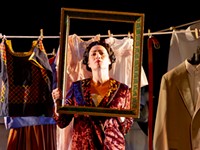
Season of death
Oct 13, 2023 -

Lewis Black talks nice, for a moment
Oct 10, 2023 - More »
